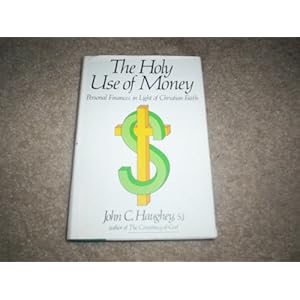From time to time we offer for sale heretical books, sometimes knowingly (one must read Kung to critique Kung) and sometimes unknowingly. The present title under discussion is a book that we had for sale in our Marriage and Family Life section. One of my co-workers happened to be reading on the job one day and spotted the heresy in the Introduction of the book. This was a heretical book that we were unknowingly offering for sale.
The book is The Holy Use of Money, Personal Finance in Light of Christian Faith by John C. Haughey, S.J. The book was published by Doubleday in 1986. Please see if you can spot the heresy:
"Transubstantiation is a metaphor. In the case of the Eucharist, the bread and wine do not physically become Christ. They remain bread and wine while they mediate the real presence of Christ to us. He really becomes food and drink for us but we don't drink and eat the Son of God. What we drink and eat mediates him to us. The marvel in this is not the change that comes over the bread and wine but the change that comes over a people God chooses to be his own when they choose to exercise the faith with which God has embued them. The Eucharist cannot be explained except that the believers believe bread and wine into being what Christ wills it to be for them. He wills it to be him for them. But he's not confined only to this mode of being present to them. More than bread and wine should mediate him to us. Money can and should, which is one reason for [this book]" pages vii-viii.
Did you spot it?
Share |

I'll take a shot: "They remain bread and wine while they mediate the real presence of Christ to us."
ReplyDeleteInstead, this should be: "The accidents of bread and wine remain after the substance has been sacramentally changed into the Body and Blood of Christ"
I'd say it's a big muddle of poorly chosen verbage and heresy.
ReplyDeleteRe. sentence 1: "Transubstantiation" is not a metaphor. It's a philosophical term that has been used to describe, imperfectly, the change that takes place to the bread and wine in the celebration of Mass.
Re. sentence 2: It's true that the bread and wine don't physically become Christ. They mediate his presence sacramentally. (Sure, that word too is imperfect, because it needs explanation, but any word employed to describe this mystery will.)
Re. sentence 3: From a scientific perspective (that is, as science would understand the use of the word "remain"), they do in fact remain bread and wine. After all, they maintain all the appearances of bread and wine, even to the very molecular level. However, on the level of essence or substance (which is a philosophical rather than scientific usage), they do not remain bread and wine; they only look like bread and wine.
Re. sentence 4: Correct, He does indeed become food for us. We don't eat and drink the Son of God physically, but we do sacramentally.
Re. sentence 6: I'd say the change IS one of MANY marvels about the Eucharistic celebration, but if we're focusing on the idea of transubstantiation (which is the subject of the paragraph), then yes, it IS the marvel here.
Re. sentence 7: "Cannot be explained except..." is a poorly chosen phrase. There are plenty of successful attempts to plumb the depths of the Eucharist other than this. The "believers believe the bread and wine into being..." Again, poorly chosen and easily misunderstood, though it could also be corectly understood. The celebration of Mass in general, and the praying of the Eucharistic prayer in particular, is indeed an action of the gathered Church, with the priest presiding and voicing their prayer.